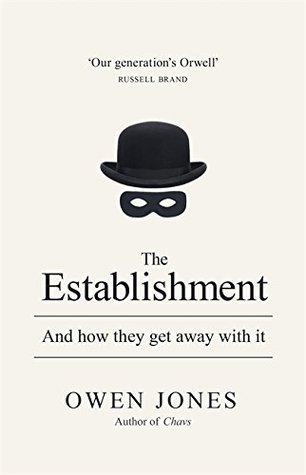 Please buy the book here. Guardian review by David Runciman.
Please buy the book here. Guardian review by David Runciman.
“Who you know” still matters, but more important now is “what you believe”.
The idea of an “establishment” was first popularised in the mid 1950s by the journalist Henry Fairlie, who coined the term to describe how the elite networks at the top of British society closed ranks to protect their own. It was an unthinking allegiance based on personal connections. Social ties trumped political ones. What mattered, Fairlie said, was not what you believe, but “who you know”.
Owen Jones has a very different idea of how the establishment now works. It has become deeply ideological. Political ties trump social ones. What links the people who presently run British society is their shared interest in maintaining a fiction about what is and isn’t politically possible. Their story goes that only a small state, with pared down welfare provisions and a premium on economic efficiency, can function in our highly competitive, globalised world. It’s a story that serves their interests because it allows them to milk the state for their own protection and benefit. Jones is careful to say that this is not “an organised conspiracy” (any more than the 1950s establishment was a conspiracy). But it is a deliberate con. Unthinking social allegiance is no longer the glue that holds the establishment together. It is now a mutual benefit society, which makes it a lot harder to prise apart.
The result of this change in definition is that Jones’s establishment is much more socially diverse and porous than Fairlie’s tight-knit gentlemen’s club. It includes all sorts of people who wouldn’t have got a look-in in the 1950s. Jones quotes the blogger and inveterate political troublemaker Paul Staines (aka “Guido Fawkes”) talking about the political class: “I hate the f***g thieving c***s.” This is not an obviously pro-establishment sentiment. Yet on Jones’s account Staines is one of the ins, not one of the outs, because he is fully signed up to the idea that the state needs to be pared back to the minimum. He belongs to the ideological “outriders” of the new establishment, in a tradition stretching back to Hayek in the 1940s. By attacking the self-serving rapacity of politicians, he is doing the dirty work of the economic and power elites for them, since he is making it far harder for any politician to take them on.
Jones’s establishment stretches far and wide. It includes anyone who stands to benefit from the free hand that the free-market ideology gives them. Some of these are the usual suspects: bankers, newspaper proprietors, civil service mandarins. But it also embraces tabloid hacks, the big accountancy firms, the police, the construction industry, the arms trade, the lobbying industry and foreign energy companies. You no longer have to be British to be part of the British establishment. Jones counts Russian oligarchs as members of the new in-crowd. This can hardly be because of their deep-rooted social ties here: many of them are barely around long enough to have any. Britain is not their home but its tax and legal system has given them the safe haven they are looking for. This is further evidence of how shared interests have become more important than shared backgrounds.
A lot of the stories in this book are the most familiar ones from recent newspaper headlines: the phone-hacking scandal, celebrity tax avoiders, Andrew Mitchell and “plebgate”. However, the Social Mobility and Child Poverty Commission has just documented the continuing hold that a narrow, privately and/or Oxbridge-educated elite has on many leading institutions – the BBC, the judiciary, the civil service, the armed forces – Jones’s analysis provides more questions than answers. Do these people believe what they believe because of who they know, or do they know who they know because of what they believe?
Traditional forms of opposition to the elite – trade unions, churches, mass membership political parties – have fallen away. This is the other side of the story Jones tells, though he gives it much shorter shrift: the new establishment is cosseted by the absence of robust institutions capable of standing up to it. “The rise of the internet,” Jones writes, “and in particular social media, provide fresh opportunities for new movements to link together. So far they have failed to do so in a coherent way.”
Yes Edinburgh West has a website, Facebook, Twitter, National Yes Registry and a Library of topics on Scottish Politics, including Independence.



